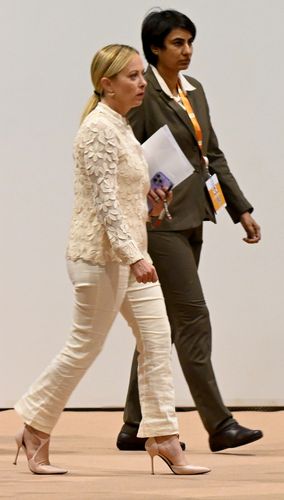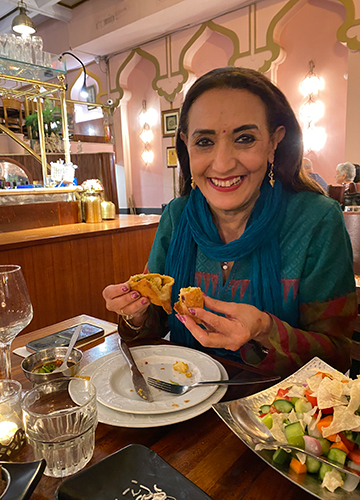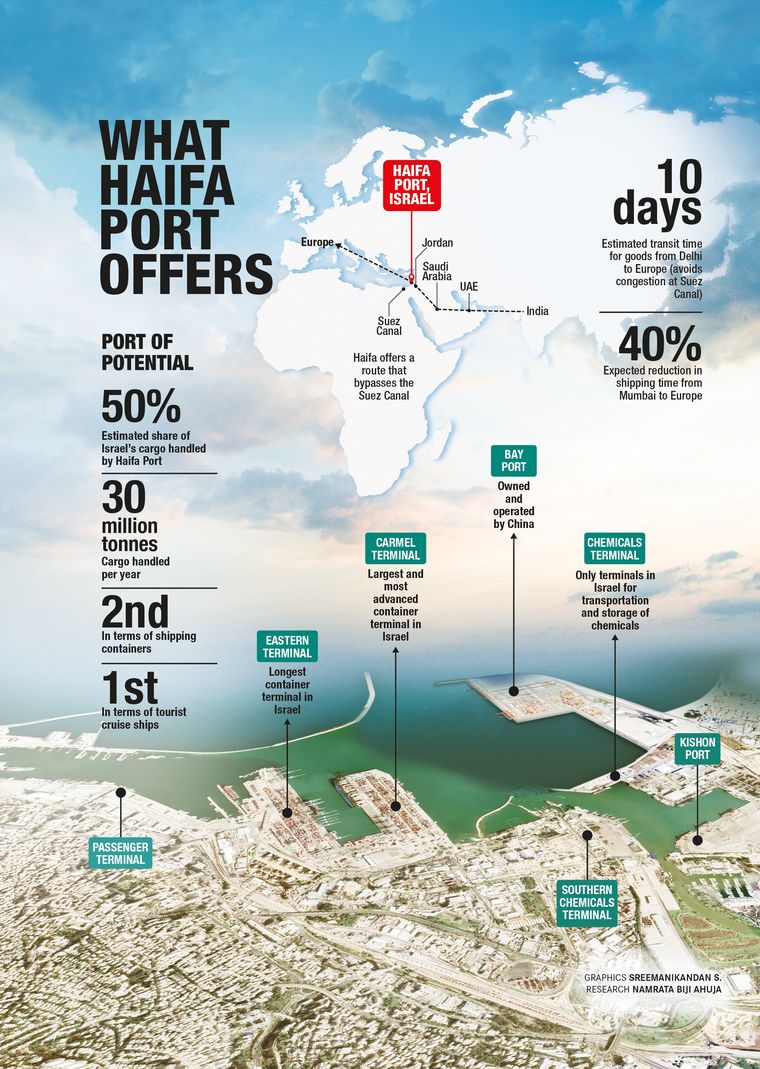The Indian tricolour flying high on the mighty Mediterranean coast may surprise visitors to the Haifa Port. Gigantic cargo ships unload goods as varied as imported cars and tonnes of grains under the shadow of the national flags of India and Israel, reinforcing New Delhi’s rising geopolitical stature. India’s ambitions of having a larger strategic and commercial presence in the Middle East has found an anchor in the Haifa Port, which connects the east to the west. Indian and Israeli officials say that the acquisition of the port has placed India at a vantage point in the brand new regional transport corridor―the India-Middle East- Europe Economic Corridor (IMEC), the ambitious infrastructure project announced on the sidelines of the G20 summit in New Delhi on September 10.
Haifa is the perfect spot for India’s strategic foray into the region, as it was in this city, located on the slopes of Mount Carmel, that Indian soldiers fought one of the crucial battles of World War I. Indian heroes liberated the historic city in the Battle of Haifa in 1918, beating back Ottoman forces. The victory is commemorated as a proud moment in Indian military history as India and Israel celebrate a sense of camaraderie and friendship. It has now grown into a relationship of trust and strategic partnership across sectors such as defence, technology, agriculture and trade.
As one enters the Haifa Port, which is within walking distance from the Haifa Indian Cemetery, the Indian influence is unmistakeable. This correspondent was welcomed by a staff member with a namaste. “A lot of Indian delegations are visiting us recently,” she said. “We are getting used to the language and culture.’’ She also shared her experience of visiting Mumbai and appeared excited about a forthcoming trip to New Delhi.
India and Israel have enjoyed political, defence and strategic partnerships for long, but the economic relationship came into focus ever since Adani Ports and Special Economic Zone Limited partnered with Israeli chemicals and logistics group Gadot to win a government tender―in July 2022―to buy the Haifa Port. The deal worth $1.2 billion was completed in January this year. Haifa Port handles about 30 million tonnes of cargo a year. It houses the Carmel Terminal, the largest and most advanced container terminal in Israel; the east terminal, the longest in Israel; and the chemicals terminal, the only one in Israel for transporting and storing chemicals. The port is estimated to handle around 50 per cent of Israel’s cargo and is the biggest in terms of handling cruise ships.
It is a “journey of dreams’’, said Prime Minister Narendra Modi as he was joined by US President Joe Biden and leaders from Saudi Arabia, the UAE and Europe on the sidelines of the G20 summit in New Delhi to unveil the corridor that aims to connect India, Middle East and Europe. “This is a big deal, a game-changing regional investment. A future that presents greater opportunity, dignity and prosperity for everyone,” said Biden. The US is expected to invest in ships and rail networks that extend from India to Europe, connected by the UAE, Saudi Arabia, Jordan and Israel. Clearly, the flavour of Bharat has transcended continents and is readying for an embrace beyond the Global South, by opening gates into the west.

“In many ways, Israel’s relationship with India is based on goodwill and people-to-people contact. Elements of Indian culture and values are very much embedded in Israel,” said Jonathan Zadka, director, department of economic affairs at the Israeli ministry of foreign affairs. “When our foreign minister visited India in May, he took with him a delegation of Israeli companies and representatives of chambers of commerce and industrial associations. The emphasis was to diversify the scope of collaboration in the economic arena,” he said.
The IMEC provides an opportunity to expand this collaboration as it branches out into two distinct corridors―the eastern corridor linking India to the Gulf and the northern corridor connecting the Middle Eastern countries to Europe. There is unanimity among the project’s partners―India, the US, the UAE, Saudi Arabia, France, Germany, Italy and the European Union―that the multi-modal commercial corridor can change trade patterns between India, the Middle East and Europe.
India is the “entry’’ point of the geostrategic arc that extends over the Arab peninsula onto Israeli shores. With investments in Haifa, it is also the “exit” point in the Mediterranean Sea for shipping goods into European and American markets. It could lead to quicker access, less cost and wider markets. For example, New Delhi is looking at shipping goods from ports in Mumbai and Gujarat to Dubai from where a rail link would connect to Saudi Arabia, onward to Jordan and finally to Haifa, without having to go around the Arabian peninsula. Here, goods can take the sea route to Bahrain and Oman or to European ports.
At the heart of this plan, however, lies the rebuilding and restructuring of the Arabian peninsula’s railway map. Both Saudi Arabia and the UAE are investing heavily in the project, aiming to integrate the region with neighbours like Israel and also with Africa and Europe by 2030. Alongside, Jordan is planning to build a nation-wide rail link with partial funding from Saudi Arabia, to connect it to the Red Sea port of Jeddah and also to Yemen and Egypt. Israel is pumping in a billion shekels (Rs2,100 crore) to expand rail links connecting its peripheral areas to Tel Aviv―and, if needed, to Saudi Arabia. With old hostilities forgotten and new bridges of prosperity being built in the region, Israeli Prime Minister Benjamin Netanyahu said his country was fast becoming a central junction of the world economy. Ran Natanzon, head of innovation at the Israeli ministry of foreign affairs, explained how his country coped with its small desert land and water scarcity. “We used our expertise in innovation and technology to turn these disadvantages into an advantage. The answer lies in trust and togetherness,” he said.
Capt Sandeep Mehta, president of Adani Ports, said the Mediterranean region was of growing interest. “The aim is to establish Haifa Port as a key hub in the Middle East and provide Israel with a unique opportunity to establish a trade route connecting the Mediterranean and the Gulf, bypassing the Suez Canal. The project is expected to cut shipping time from Mumbai to Europe by 40 per cent and allow Delhi to ship goods to Europe within 10 days via a connecting railway passing through Saudi Arabia, Jordan and Israel,” he said.
The Israelis are already associating the Indian presence on its soil with adding strategic value, regional connectivity and commercial prospects for the entire region. There is hope that the close ties may facilitate the long-delayed free trade agreements between India and the EU and also with Israel. “India is not a trivial market, it offers a huge global outreach,” said Zadka. “Its complexities and potential need to be understood because this is a collaboration for the long term.”
India demonstrated its influence in 2018 when it convinced Saudi Arabia to open up its airspace for Air India to reach Israel, breaking a 70-year-long ban on commercial planes flying over the Arab kingdom to reach the Jewish state. Five years later, the IMEC is being seen as a project that can replicate that success in shipping lines and rail networks for seamless transportation of goods and fostering deeper ties between people. “The Haifa Port will act as a major trans-Mediterranean maritime link to the European mainland, which will ease the transhipment of Indian goods to major markets in Europe,” said Ron Malka, executive chairman of the Haifa Port.
The nuts and bolts of the corridor will be worked out in the coming months and years. But, even before that, India has scored two crucial wins. It has offered a viable alternative to China’s Belt and Road Initiative (BRI) and the debt trap it could cause, which has left many countries disillusioned. Already, Italian Prime Minister Giorgia Meloni signalled her country’s intent to exit the BRI in favour of the IMEC, paving the way for similar exits. Second, the EU and Arab partners are talking about the benefits of a cost-effective ship-to-rail transit network, laying electricity and digital connectivity cables and creating a pipeline for renewable energy resources, including hydrogen.
Clearly, the list of tangible gains of bridging the gap between the east and the west is a long one. At a time eastern Europe is aflame with the Ukraine crisis and continues to deal with the winter gas shortage, neither economic dependence on China nor energy dependence on Russia is palatable anymore. It has put the Middle East and North Africa back on the centre stage in global energy manoeuvres.

The IMEC has also given the US a chance to project itself as a responsible leader to its allies and partners. Besides pumping in the dollars, the US continues to be a key player in the Middle East―first brokering the Abraham Accords between Israel and the UAE in 2020, subsequently joined by Bahrain, Morocco and Sudan. Washington is now wooing Saudi Arabia to join the initiative. The US sees the proposed corridor as a way to promote high standards of governance, social responsibility and environmental protection in global development. The White House also projects it as a way to enhance trade and investment, while addressing common challenges of climate change, terrorism and pandemics by strengthening partnerships with India, Europe and Arab countries.
Also read
- Modi’s Israel visit: Breaking protocol, Netanyahu and wife Sara to welcome PM at Ben Gurion airport
- Greece and Israel want India to join Cyprus alliance after Turkey emboldened by Pakistan: Report
- India to buy Israel's Rampage, Air LORA, and Ice Breaker missiles for IAF? Here's why they matter | 10 FACTS
- What are SPICE-1000 precision-guided bombs that India is set to buy from Israel for the IAF? 5 POINTS
A senior Indian official said the IMEC had created more room for New Delhi to expand cooperation with the US navy beyond the Indian Ocean, especially at a time when it is countering the Chinese ‘string of pearls’ with its ‘necklace of diamonds’ strategy. Incidentally, India and China are neighbours in Haifa, as well. In September 2021, the Shanghai International Port Group of China opened an automated container terminal in Haifa with the rights to run it for 25 years. The Chinese terminal is painted red and marks the dragon’s presence deep in the sea. But it is dwarfed by the massive old port of Haifa acquired by India. The Chinese asset is more compact, less attached to the mainland but is visible to the naked eye from the Haifa coast, serving as a constant reminder of the pervasive Chinese presence across the world, requiring India to be watchful. “With China, there are more sensitivities involved today because of its relations with the US. But it is not a country that can be pushed aside,” said an Israeli official.
Israel sees India as a crucial partner in its outreach to the east, especially with states in the Arab neighbourhood with which it had a tense past, and even with Iran. “India should play a larger role in Israel’s foreign relations,” said Anat Bernstein-Reich, president of the Israel-Asia Chamber of Commerce. She said it was encouraging to see India’s growing relations with the Middle East. “With the Abraham Accords between Israel and Arab states aspiring for a new Middle East, India’s and Israel’s interests are only converging.” She said India had the ability to play a historic role in solving the Iran-Israel rivalry. “Iran very clearly states that it aims to wipe out Israel. India, being Israel’s friend, cannot ignore such statements.”
Fleur Hassan-Nahoum, deputy mayor of Jerusalem and co-founder of the UAE-Israel business council, too, is upbeat about the growing closeness between Israel, India and the Arab states. “The triangulation between India, Israel and the Gulf countries is extremely important. This regional partnership is a game-changer for all,’’ she said. It has quickly turned into multilateralism of a bigger kind with the new corridor in the making.
The challenges before the proposed corridor are manifold. It is likely to set off yet another round of geopolitical and geoeconomic manoeuvres in the region. Saudi Arabia is already in talks with Iraqi officials for a trans-Iraq railway and highway initiative to capitalise on the latter’s geographical position for easy movement of goods and people between the Gulf, Turkey and Europe. For India, which has been trying to open up a route to Central Asia via the Chabahar Port in Iran and Afghanistan for some years now, bypassing Pakistan, the IMEC offers a safer alternative.
India, meanwhile, is aware of the fact that the proposed corridor will take time before it unlocks its benefits. The funding patterns for the Middle East rail links, the gaps and challenges in the desert region and the fine balancing of strategic interests have to be worked out. Domestically, the Indian maritime industry has its own challenges related to digitisation, implementation of new technologies, management of human resources and improving hinterland connectivity through rail, roads and highways. “There is the need for greater technological upgrade and integration,’’ said Mehta. “Implementation of artificial intelligence technologies and manpower training is essential to manage these changes without disrupting operations.’’ The government is taking several initiatives, including the Sagarmala project, which is expected to provide relief from last mile connectivity issues that cause severe congestion in ports. But more needs to be done on this account.
Even with the euphoria of the proposed corridor, India and Israel realise that it was the classical pillars of collaboration that have laid the foundation for new sectors of partnerships. Sanjeev Singla, the Indian ambassador to Israel, and his team are busy cementing old ties while they work on future collaborations with Israel. The embassy in Tel Aviv is also attracting visitors clicking selfies and photographs, showing the growing Indian imprint in the region. “It is just amazing to see the current diversity of business interests, and the openness of both sides to seek collaborations. Earlier it was only IT, water and defence. Today, there are 20 major areas and it is just growing,” said Anat.
The people-to-people contact has increased significantly over the years with Israelis turning to India for food recipes, yoga, ayurveda, music and films. Indian-origin celebrity chef Reena Pushkarna, whose restaurant Tandoori in Tel Aviv famously treats Netanyahu and his wife, Sara, to Indian dishes on relaxed weekends, said the fact that she won the Pravasi Bharatiya Samman this year showed the transformation of Indo-Israeli friendship beyond defence and trade.
Professor Yochanan Grinshpon, who teaches at the department of Asian Studies at the Hebrew University of Jerusalem, said that as a young man, he found his anchor in the teachings of Bhagavad Gita and the Upanishads. “These are the biggest influence of my life,” said Grinshpon. Today, many Israeli students are keen to learn Sanskrit, besides other languages like Mandarin. “Most students want to learn Mandarin for commercial interests,’’ said Grinshpon. But as commercial interests shift eastward and India opens itself to newer opportunities in the Arab-Mediterranean region, the India-Israel embrace is only getting deeper and warmer.




